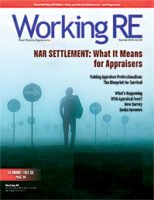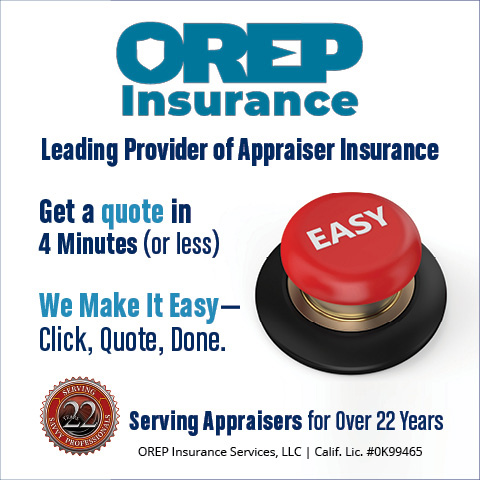 |
> The Appraiser Coach
> OREP E&O |
Valuing Appraiser Professionalism: A Blueprint for Survival
by Jo Traut, McKissock Learning
Having spent nearly three decades in the field of real estate appraisal, I’ve witnessed firsthand the evolution of our profession, particularly with respect to technological advancements. However, alongside these positive changes, I’ve also observed a troubling trend toward increased unprofessionalism. This phenomenon isn’t unique to our discipline. It’s permeated other careers, from medical professionals to teachers to business managers.
In some cases, widespread use of social media has led to inappropriate online behavior and become a significant contributor to declines in professionalism. This can have detrimental effects on crucial, valued qualities, such as integrity, empathy and selflessness, among professionals.
This trend is particularly concerning for real estate appraisers, as professionalism is an indispensable skill, especially during periods of slower market activity. Without a foundation of professionalism, an appraiser’s business is at risk of collapse. Compared to other sectors like education and healthcare, our profession is relatively small. Any lack of professionalism, whether on social media, during client interactions or when responding to requests for appraisal modifications, can quickly follow the appraiser.
Regrettably, I’ve seen instances in which appraisers have responded to lender requests unprofessionally and publicly criticized colleagues, companies or clients on platforms like LinkedIn or Facebook, or even in direct communication. Real estate appraisers must remember that their behavior online, in emails or over the phone serves as their calling card, potentially impacting their current and future opportunities.
Further, appraisers also need to recognize that anything communicated via email or posted on social media is discoverable, underscoring the importance of exercising caution and professionalism in all forms of communication. Whether seeking job opportunities, pursuing roles as appraiser educators or engaging as expert witnesses, appraisers must always consider the potential repercussions of their words and actions, now and into the future.
Professionalism isn’t limited to communication; it’s the combination of all the qualities connected with trained and skilled people. These qualities include integrity, reliability, expertise, accountability, respectfulness and a commitment to excellence. As such, its preservation and promotion must be a top priority to survive turbulent times in the residential or commercial real estate markets.
As an appraisal educator, I’ve received requests from fellow appraisers, regulatory officials, owners of major appraisal firms and other stakeholders to teach about professionalism and emphasize its importance to colleagues. Recently, in a conversation with a medical professional, I learned that their education includes courses on professionalism. Inspired by this, let’s discuss what professionalism means in the appraisal profession and how we can all work toward achieving it.
Integrity
Remain steadfast in your commitments, stay true to your word, and uphold your principles, even if this requires declining an appraisal assignment or future work with a client or their agent. By staying honest and true to your values, others are more likely to trust and collaborate with you or recommend you and your business.
(story continues below)
(story continues)
Reliability
Demonstrate reliability by consistently meeting deadlines, delivering quality work and showing up to inspections or meetings on time. When committing to an appraisal assignment or project, ensure you can complete it effectively and on time. Communicate with your client promptly if unexpected issues arise. Avoid overpromising; only accept assignments you can fulfill with excellence and within the designated time frame.
Building a reputation for dependable, high-quality work increases your chances of receiving future assignments. In my experience working with a panel of fee appraisers, we prioritized appraisers known for their reliability and quality, often offering them higher compensation. During slower periods, these trusted individuals were our first choice for assignments.
Expertise
Professionals strive for proficiency in their field, continually enhancing their knowledge through education, webinars and personal development efforts. It’s not just about acquiring designations but staying informed about market dynamics, industry changes and emerging trends.
This involves sharpening your technological skills and perfecting your ability to apply methodologies and techniques. For example, establish annual objectives to develop new skills, like mastering Excel or refining methods for conducting market analyses.
Accountability
Professionals prioritize accountability, especially when acknowledging mistakes. This personal responsibility is closely linked with honesty and integrity, forming a crucial aspect of professionalism. If a client requests a review of an appraisal for potential errors or possibly overlooked comparable sales, approach the situation objectively. Determine whether there was a missed comparable sale or an error in the development or reporting of the appraisal.
It’s better to take ownership and correct the issue rather than make excuses or avoid accountability. Refrain from justifying subpar work by citing payment or time constraints, and instead, meet the expectations of the appraisal assignment without shortcuts. While mistakes happen, admitting and addressing them is a hallmark of professionalism.
Respectfulness
Professionalism entails serving as a model of politeness and good manners, extending courtesy to all, regardless of the need to impress. This involves punctuality, maintaining a positive demeanor and dressing in appropriate attire. Avoid attending appointments in ripped jeans or flip-flops, which projects an image unsuitable for professional engagements.
Seek to understand others’ perspectives, fostering empathy and offering support accordingly. Avoid using sarcasm or disrespectful comments when responding to an underwriter’s inquiry about your appraisal report.
When using social media for business promotion, ensure the content remains professional and refrain from insulting other professionals, organizations or entities. If you disagree with a policy or decision, there are appropriate channels to express your opinion or advocate for change. However, you need to do so in a professional manner. Consider how you would feel if someone published similarly disparaging remarks about you or your business, and refrain from resorting to slander against individuals or entities.
When meeting with a homeowner or attending meetings or classes, avoid checking your personal social media sites and turn off phone notifications, so you won’t be distracted while completing the inspection or attending the meeting or class. Being respectful means giving your dedicated attention. Do you need to prioritize that Facebook posting, email message or text message, or can it wait for an hour or more?
Also, offer to help colleagues when they ask questions or are trying to solve challenging appraisal issues. Don’t feel compelled to discourage someone from asking questions or convey condescending remarks when responding. We all have room for growth, and learning from one another fosters an open and welcoming environment.
Commitment to Excellence
True professionals are prepared, which entails advance planning, dedicating sufficient time and giving proper attention to tasks. Before delivering work to clients, conduct a thorough review to mitigate potential errors. Acknowledge and address any skill gaps or lack of competency promptly and transparently, ensuring a commitment to excellence in every endeavor.
Clients and colleagues value working with individuals who exude positivity and optimism. By approaching tasks with motivation and a positive attitude, you can inspire similar behaviors in others. In the face of challenges in your appraisal business, prioritize problem solving over dwelling on grievances or blaming policies and others.
A Professional Mindset
Professionalism stands as the cornerstone of survival and success in the ever evolving landscape of real estate appraisal, especially amidst turbulent times. At its essence, professionalism isn’t just a skill, it’s a mindset—a commitment to excellence, integrity and respect that guides us through challenges and paves the way for long-term success.
When we strive to uphold professionalism, we not only safeguard our own reputation but ensure the sustainability and credibility of the real estate profession for generations to come.
About the Author
Jo Traut has been a real estate appraiser since 1997 and currently holds a certified residential appraiser license in Illinois and Wisconsin. Jo specializes in appraising luxury homes, valuations for lending purposes, relocation appraisals, appraisal review and appraisal compliance. Jo previously was residential chief appraiser for the fifth largest bank in the United States. She currently serves as director of appraisal curriculum at McKissock Learning.
OREP Insurance Services, LLC. Calif. License #0K99465




by Richard W Stillman
What an excellent article. However, it is too little too late. Even after 22 years of appraising, I still fight the headwinds of having to be the fastest and cheapest appraiser in the market. So, I don’t. I gave up, many years ago, the pursuit of business of valuing the most important asset of most people’s lives using the lender methodology – because of the AMC model that will forever be a parasite on this once so-called profession. Now, it has turned into a commodity market, on a race to the bottom. It has become a sideline gig for the shallow end of the labor pool. I know people earning more money driving for Uber than I could make working for AMCs. The expertise and experience I have gained along the way have not gone to waste, as I have evolved into a super appraiser of sorts that specializes in litigation work. In that world, there is no room for anything less than “real” professionalism. So, alas, there is hope, but don’t call being an appraiser a profession – because that was run into the ground with the advent of AMCs. The reports I see from time to time from AMC appraisers are not only low quality – many of them are unacceptable. There seems to always be room for the “McDonalds” business model – which is to be fast and cheap and sell a lot – but that model never seems to put the quality approach to business out of business. How interesting. There is always room at the top for high quality, but it’s not easy to attain that level. I refuse to subscribe to the “another day, another dollar” approach to business. This is supposed to be important work that we do – but it’s not. It’s one big “mill” with the blind leading the blind. Still, for a gig, it’s right up there near the top. What a sad state of affairs. Does anyone think that this article has a chance to change anything – even as good as it is? Not a chance.
-